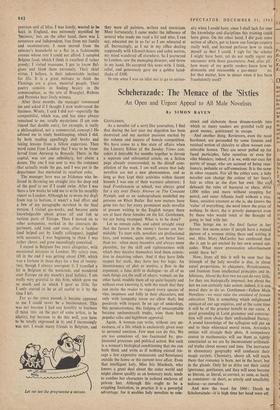Scheherazade: The Menace of the 'Sixties
An Open and Urgent Appeal to All Male Novelists.
By SIMON RAVEN
G ENTLEMEN, As a novelist (of a sort) like yourselves, I find that during the last year my digestion has been destroyed and my nastiest passions excited by the volume and success• of female competition. We have come to a fine state of affairs when the Literary Editor of the Sunday Times con- siders it desirable for months together to devote a separate and substantial article, on a fiction page already overcrowded, to the distaff com- pilation of the week. I am well aware that lady novelists are not a new phenomenon, and as long as they kept their activities within decent bounds I was one of their warmest admirers: I read Frankenstein at school, was always good for a cry over Dusty Answer or The Constant Nymph, and as an undergraduate modelled my persona on Rhett Butler. But now matters have gone too far; for every prominent male novelist at present writing in the English tongue there are at least three females on the list. Gentlemen, we are being swamped. What is to be done?
Let us remain calm, and admit straight away that the factors in the enemy's favour are for- midable. To start with, novelists are professional liars, and women, quite simply, are better liars than we: often more inventive and always more plausible, for the skill and righteousness with which they deceive themselves lend them convic- tion in deceiving others. And if they have little respect for truth, they have less for logic. An inconsistency of plot or motive, a flaw in the argument, a false drift in dialogue—to all of us such things are the stuff of ulcers; women, on the other hand, muddle them all up quite happily and without even knowing it, with the result that they can invite the reader to regard every species of vice, ineptness and folly in their characters, not only with 'sympathy (even we allow that), but positively with respect. In an age of underdogs, this permissiveness, this fudging of unacceptable because undemocratib truths, wins them both popular sales and highbrow approval.
Again. A woman can write, without any un- easiness, of a life which is exclusively given over to personal emotion. Few men can do this. We are too conscious of, too fascinated by, pro- fessional processes and political action. But such is a woman's biological conditioning that she can both think and write as if nothing existed (ex- cept a few expensive restaurants and -boutiques) outside the home or the current love affair. Even that intelligent lady, Miss Iris Murdoch, who knows a great deal about the outer world and might almost qualify as an honorary male, tends to confine her characters in isolated enclaves of
private lust. Although this ought to be a crippling limitation, in practice it is a powerful advantage; for it enables lady novelists to con-
struct and elaborate those dream-worlds into which so many readers are grateful (will pay good money, gentlemen) to escape.
And another thing. Reviewers, even the most hardened, are persuaded by some fatuous and residual notion of chivalry to allow women con- siderable licence. They are never pulled up for fused participles, false optatives or even for viler blunders; indeed, it is we, with our care for purity of usage, who are accused of being reac- tionary, pedantic or self-conscious. It is the same in other respects. For all the critics care, a lady novelist can change the colour of her hero's hair as often as she dyes her own. She case debauch the rules of baccarat or chess, driVe 1,000 miles and more without stopping for petrol, and enter Albania itself without a visa. Since, sensitive creature as she is, she knows the `value' of everything, she need know the price of nothing. In short, she is grossly pampered even by those who would retch at the thought of going to bed with her.
This brings me to the final factor in her favour. Sex seems sexier if people have a mental picture of a woman sitting there and writing it out. Miss Mary McCarthy has confessed that she is apt to get excited by her own sexual epi- sodes. What more provocative advertisement could there be?
Now, from all this it will be seen that the triumph of the lady novelist is due, in about equal proportions, to chicanery, flirtatiousness, and freedom from intellectual principles and in- hibitions. About the first two we can do very little, for they are biologically imposed; but about the last we can certainly take action; indeed, it is oun. moral duty to do so. Gentlemen—Fellow Male Novelists—we must raise the standard of female education. This is something which enlightened opinion of our age requires, and at the same time it will be of the greatest benefit to our cause. A good grounding in Latin grammar and construc- tion will soon choke their undisciplined fluency. A sound knowledge of the syllogism will put an end to their whimsical moral twists. Aristotle's unities will strangle their plots. A compulsory course in mathematics will see them as tightly constricted as we are by inconvenient arithmeti- cal truths about money and time. The instructor in elementary geography will confiscate their magic carpets. Chemistry, above all, will teach them that romance is born, not in the heart, but in the glands. Only let us drive out their sinful ignorance, gentlemen, and they will soon become as literate, as literal, as correct, as sane, as lucid, as consistent—in short, as utterly and unsellably tedious—as ourselves.
And now the toast for 1966: Death to Scheherazade—it is high time her head were off.
















 Previous page
Previous page